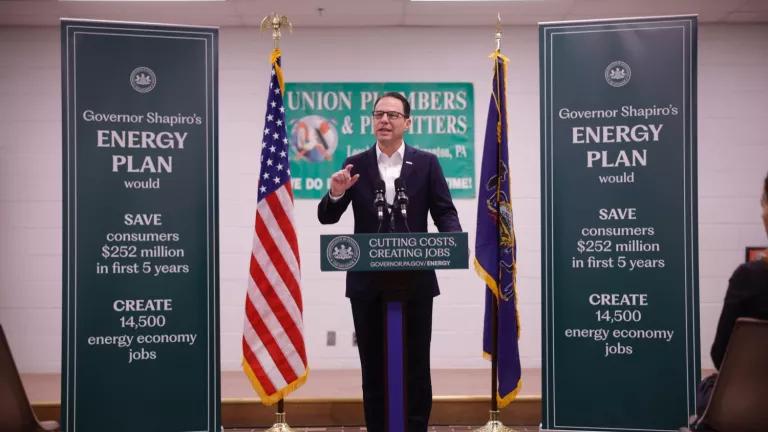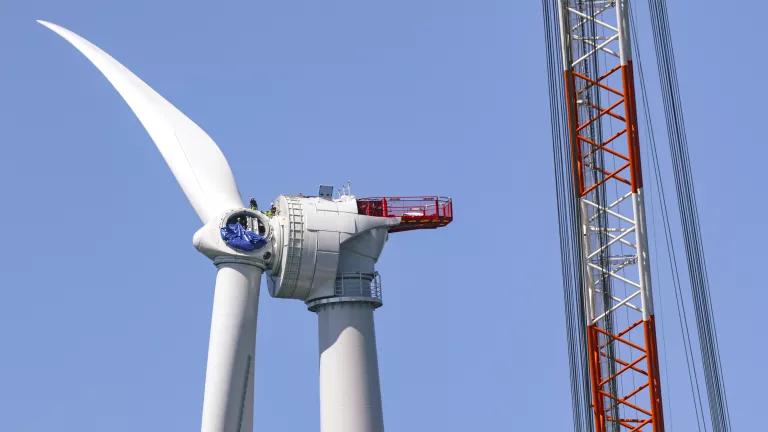
Co-authored with Alex Hillbrand and Tasfia Nayem
This summer marks 30 years since NASA scientist James Hansen testified to the U.S. Congress about the dangers of climate change. His warning, delivered in the midst of a heat wave, was a harbinger of the warming to come—that year, 1988, was the hottest on record at the time, a record that has since been topped by more than 20 of the 30 following years.
Hansen’s testimony is a timely reminder of the urgency to act on climate change, as delegates gather in Vienna for the mid-year meeting of the Montreal Protocol this week. The Montreal Protocol is the treaty that saved the ozone layer and, as a bonus, has done more than anything else to curb heat-trapping pollution that drives dangerous climate change. Chlorofluorocarbons (CFCs) and their kin are major sources of climate-polluting emissions that were phased out under the Montreal Protocol. The current generation of these gases—hydrochlorofluorocarbons (HCFCs) and hydrofluorocarbons (HFCs)—are hundreds to thousands of times more potent than carbon dioxide at warming the planet. These super-pollutants are found in air conditioners (ACs), refrigerators, supermarket freezers, aerosols, building insulation, fire extinguishing systems, and other uses.
The Montreal Protocol and its amendments have been instrumental in phasing out CFCs and HCFCs, and nations adopted the Kigali Amendment in 2016 to phase down HFCs. The Kigali Amendment sets in motion an 85% reduction in HFC use worldwide over the coming decades, avoiding as much as 0.5°C of further warming. The Kigali Amendment focuses on a phase down, and not a phase out, since there are a few essential uses of HFCs where no substitutes exist, such as metered dose inhalers.
Key issues on the agenda at the Montreal Protocol meetings this week are HFCs and the Kigali Amendment, as well as emerging CFC compliance issues. With the Amendment going into effect in early 2019, world leaders are convening in Vienna to work out the details needed for implementation. The top issues to watch on the HFC phase-down are energy efficiency and financing.
Energy Efficiency and the Kigali Amendment
With strong support as part of the Kigali Amendment to include efficiency, countries are now hashing out how the Montreal Protocol should specifically address energy efficiency during the transition away from HFCs. Switching refrigerants presents an opportunity to simultaneously upgrade designs and components to make more energy efficient appliances. Many nations are already moving forward with standards and incentives to improve appliance efficiency through domestic policies, while others are awaiting clarity under the Montreal Protocol.
During the Vienna meetings, nations will discuss findings by the Technology and Economic Assessment Panel to the Montreal Protocol (TEAP), which was asked for advice on incorporating energy efficiency initiatives as HFCs are phased down in the AC, refrigeration, and heat pump sectors. A dedicated workshop on energy efficiency opportunities is scheduled for this week.
Countries, such as India, have made significant progress in improving efficiency in appliances, particularly with ACs. India’s appliance labeling program has strengthened AC efficiency standards by about 35% since 2006. Just this past month, India demonstrated further ambition by announcing that the government will consider setting the mandatory indoor default for ACs at 24°C (75°F), encouraging consumers to not over-cool their homes and to save both money and energy on electricity bills while aiming to reduce air pollution. In addition to domestic policies, India has signaled strong support for energy efficiency internationally under the Montreal Protocol.
NRDC, along with partners The Energy and Resources Institute (TERI) and the Institute for Governance and Sustainable Development (IGSD), are releasing a new factsheet during the Vienna meeting profiling both government and market progress on climate-friendly ACs in India. The factsheet also identifies strategies to further improve ACs in the Indian market, including opportunities under the Montreal Protocol. The factsheet is a part of our Cooling India with Less Warming series, which highlights the business case for switching to climate-friendly ACs.
Financing Efficiency Improvements During the HFC Transition
Financing is key to the equitable transition away from dangerous refrigerants. The Multilateral Fund—which has financially supported the phase-out of CFCs and HCFCs in developing countries—has been instrumental to the success of the Montreal Protocol. Financing energy efficiency improvements during the HFC phase-down can help unlock the potential for vast reductions in energy use from AC and refrigeration products. The Montreal Protocol can help guide investments in energy efficiency where needed to ensure that companies are able to improve the efficiencies of their products while switching to climate-friendly refrigerants.
In a decision accompanying the Kigali Amendment, nations agreed to fund HFC phase-down efforts while “maintaining and/or enhancing the energy efficiency” of climate-friendly replacement technologies, a nod to the opportunity to make efficiency improvements during the HFC transition. The decision indicated the possibility to fund these improvements, at least in part, through the Multilateral Fund.
The question before nations at the meetings this week is how to use the Multilateral Fund to support these efficiency efforts and leverage greater support from other international funds. Several nations are exploring strategies to use the Multilateral Fund to coordinate funding and incentive programs for energy efficiency improvements. Potential strategies include co-funding with other financial institutions (such as the Global Environment Facility, the Green Climate Fund, and the World Bank) and tapping into market mechanisms (such as bulk procurement programs).
NRDC is hosting a side event during the Vienna meetings to discuss financing energy efficiency during the HFC transition. This event will explore the potential for donor funding and finance institutions to improve AC and refrigeration energy efficiency in developing countries. Key discussions will center around mobilizing capital and other catalytic donor support to alleviate the cost burden on manufacturers, foster market demand, accelerate the commercialization of new technologies, and build enabling environments, with a focus on experience from the world of climate finance. The side event will be held at 1 pm on Tuesday, July 10th in Room M7 of the Vienna International Centre.
The Montreal Protocol is among the most successful international treaties in the world, but there is much work left to be done on global warming, as Hansen warned 30 years ago. But with nations working together on the treaty and a track record of a nearly 99% decline in the emissions of ozone-depleting chemicals, the Montreal Protocol has the infrastructure for proven success. With key decisions on efficiency, financing, and other important issues, the Vienna meeting can make significant progress towards a climate-friendly future.
Highlighted Resources
- Chilling News: Spotlight on Illegal CFC Production and Use
- Outcomes of last year’s Montreal Protocol meetings
- Daily updates of the Vienna meetings
- Cooling India with Less Warming: Affordable and Efficient ACs




